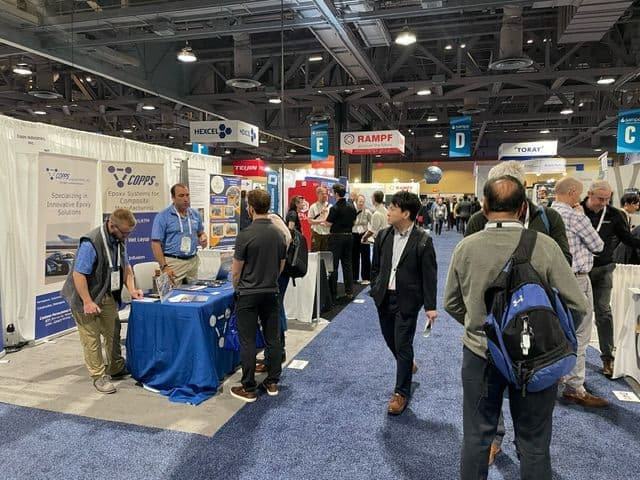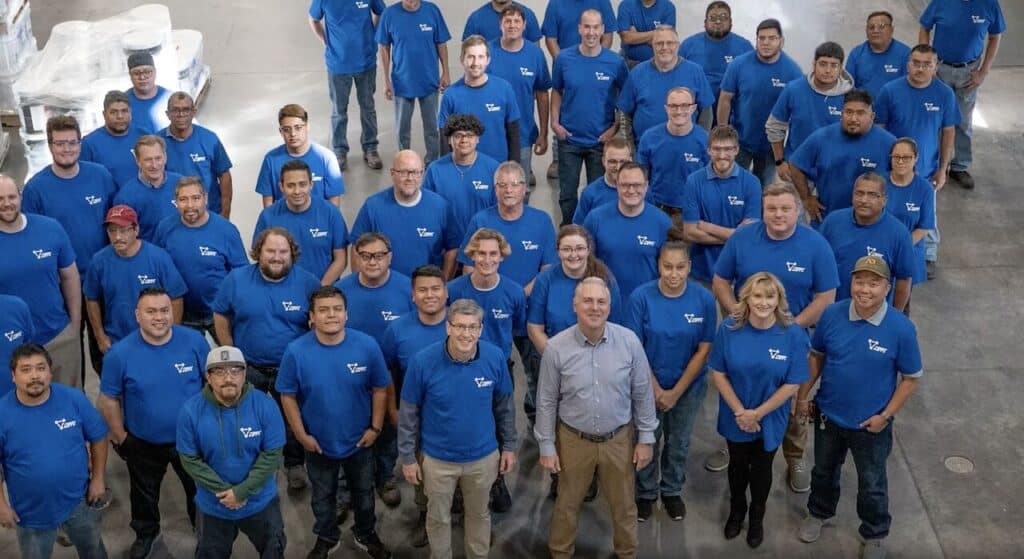Recap: SAMPE Annual Conference and Exhibition 2024
Leave a CommentAs a professional society dedicated to providing information and resources, the Society for the Advancement of Material and Process Engineering (SAMPE) is a valuable network for scientists, engineers, and researchers. The SAMPE Annual Conference and Exhibition brings together professionals from around the world to explore the latest advancements in materials and processing technology.
Copps Industries is excited to have participated in the SAMPE Annual Conference and Exhibition 2024, held in Long Beach, California, May 20-23. Featuring a variety of speakers, technical papers, educational sessions, and an expansive expo, the event is a place where groundbreaking ideas are exchanged. Here, we’re sharing some of the highlights and key takeaways from this year’s conference.

Keynote Address: Empowering the Materials and Process Community
An inspirational session at the conference was the keynote address, “Empowering the Materials and Process Community for Tomorrow’s Innovations,” by Stephen Heinz from the Composite Materials Division at Syensqo. Heinz discussed how industries reliant on composite materials have faced rapid disruption with the evolution of advanced air mobility and advances in technologies. He emphasized the need for materials and process professionals to innovate at the same pace to continue to advance the industry.
Themes of Advancement and Sustainability
The conference featured several sessions and panels reflecting key themes of advancement and sustainability. Some of those sessions included:
- Advancing Composite Materials Technology, which emphasized the importance of collaboration between academia and industry to drive innovation in composite materials and prepare the next generation of engineers to continue this progress.
- Sustainability and Circularity in the Advanced Materials Industry, which explored strategies for sustainability in the production and use of advanced materials and shared insights to help businesses integrate sustainable practices into their operations and product life cycles.
- Sustainability and Applications of Advanced Materials, which looked at the various applications that contribute to sustainability, from lightweight composites that reduce fuel consumption to materials designed for renewable energy systems.
Another standout session was “Doing Business in Mexico,” where Dr. Yadira Gochi-Ponce highlighted Mexico’s leadership in advancing multifunctional materials and the country’s significant aerospace manufacturing contributions.
USDOE & SAMPE Co-Sponsored Workshop
One of the key conference highlights was a workshop on Advanced Materials for Hydrogen Infrastructure Technologies, co-sponsored by the U.S. Department of Energy (USDOE) and SAMPE. The workshop examined state-of-the-art advanced materials like fiber-reinforced composites. Participants left with a better understanding of current challenges and opportunities and potential strategies to reduce costs and improve performance.
Exhibit and Customer Engagement
The exhibition floor bustled with manufacturers and suppliers showcasing their latest products and innovations, offering organizations the opportunity to engage face-to-face with potential customers and partners. For participating companies like ours, the exhibit hall offered valuable opportunities to connect with customers and gain insights into market demands and emerging trends.
Connecting to Copps Industries Values
Copps Industries emphasizes many of the same themes highlighted at the SAMPE 2024 Annual Conference as part of our ongoing commitment to innovation and sustainability. This includes our dedication to advancing materials technology and exploring sustainable solutions for our customers and the community.
The SAMPE conference provided a platform for industry professionals to exchange ideas, explore innovations, and foster connections. From an inspiring keynote to engaging sessions on sustainability and advanced materials, the event showcased how the engineering community is addressing some of today’s most pressing challenges. At Copps Industries, our commitment to sustainability and cutting-edge innovation ensures we continue to meet the evolving needs of our customers in the materials industry.
Industry Insights: Why Dry Process May Be Your Best Composite Epoxy Solution
Leave a CommentWhen it comes to composite manufacturing, you can choose from many materials and methods, each with unique advantages. Among the choices, two techniques stand out: the dry process and pre-impregnated (or pre-preg) process. Understanding the differences between the two will help you settle on the most effective way to bring your project to life.
Here, we’re comparing the dry process versus pre-preg to shed light on their characteristics and applications. From cost efficiency to customization to performance, you’ll learn that the dry process is often the best composite epoxy solution.


What’s the difference? Dry Process vs. Pre-preg Solutions.
Dry process and pre-preg solutions are two common methods for applying epoxy resin to fabric substrates. Each method comes with its own characteristics and applications.
Dry Process
In the dry process, a raw carbon fiber tow or fabric is loaded into a mold and epoxy resin is used to saturate the substrate. The resin then cures, bonding the fibers together to create a solid composite structure.
Characteristics
- Requires separate handling and application of resin and dry fibers
- Offers flexibility and customization in material selection and layup techniques
- Can reduce material waste and enhance performance
- More cost-effective and compatible with automation compared to pre-preg solutions
Pre-preg Solutions
Pre-preg refers to a composite material where reinforcing fibers are pre-impregnated with a resin before use. This pre-impregnation is typically done by the manufacturer, who applies a precise amount of resin onto the fibers and then cures them to a partially cured state. The pre-preg materials are then stored in a freezer until they are ready to be used. When heated, the resin cures, bonding the fibers together to create a solid composite structure.
- Characteristics:
- Reinforcing fibers are already impregnated with resin, simplifying handling and processing
- Requires freezer storage to prevent premature curing
- Offers consistency in material properties and performance
- Typically more expensive than the dry process due to additional processing and handling
Both dry process and pre-preg solutions have their advantages, and the choice between them depends on cost, production volume, and performance specifications. The dry process offers several benefits that make it the best choice for most applications:
- Cost Efficiency:
The dry process involves lower material costs compared to pre-preg solutions. Pre-preg materials are often more expensive due to additional processing and handling.
- Customization:
The dry process allows for easier and faster customization and flexibility in material and techniques. You can tailor the resin type, fiber orientation, and layering technique to meet specific requirements and optimize the finished product.
- Reduced Material Waste:
With pre-preg solutions, unused or excess material can lead to waste due to limited shelf life, resin wasted in pattern cuts, and storage requirements. In dry processing, the fibers and resin are combined in the mold as needed, which reduces waste and limits your environmental impact.
- Improved Handling and Storage:
Dry materials are easier to handle and store than pre-preg solutions, which require storage in freezers. This simplifies logistics and reduces the risk of material degradation during transportation or storage.
- Faster Production Times:
Pre-preg solutions require additional processing steps and curing time, while dry processing offers faster cycle times and increased efficiency. The dry process allows you to streamline production without compromising quality.
Copps Industries Composite Epoxy Solutions
If you want to streamline your production processes, enhance product performance, and reduce costs, consider dry processing as the ideal composite epoxy solution. From cost-effectiveness and customization to enhanced performance, it offers benefits across a range of applications.
Copps Industries offers a range of standard and custom epoxy resin systems designed to meet your needs. Whether you need assistance with formulation selection or a solution tailored specifically to your project, we’re here to help. Contact us to place your order or request a quote.
5 Key Questions to Ask Your Supplier: How to Choose the Right Partner
Leave a CommentWhen it comes to your business, the right partners can mean the difference between stagnation and success. But when faced with making a choice, distinguishing between a transactional supplier relationship and a transformational partnership can be a challenge.
At Copps Industries, we understand the pivotal role of partnership in delivering long-term value. With a mindset of mutual success, we strive to redefine manufacturer-supplier collaboration. We believe that beyond providing high-quality products, the right partner should offer transparency, fill knowledge gaps with their expertise, and provide proactive support.

We’re breaking down five critical questions to ask when you’re evaluating potential supplier partnerships.
1. How do you approach product development?
When assessing a potential partner, it’s important to understand their approach to product development. Are they focused on pushing the products already in their portfolio, or are they willing to tailor solutions to your specific needs and requirements?
At Copps Industries, we pride ourselves on a solutions-oriented approach, working closely with our customers to develop customized solutions that deliver real value. Plus, we continually push for improvement and innovation by refining existing formulations and venturing into uncharted territories.
2. What level of involvement can we expect from your technical experts?
Access to technical expertise can be a game-changer when it comes to coping with complex challenges. Does your prospective partner have experts on staff who can fill knowledge gaps and provide insights? Are they available to you?
Copps Industries offers easy access to a diverse team of technical experts dedicated to empowering your success. And with the Virtual Copps’ Chemist, you get to harness our expertise in every aspect of product development, use, and delivery.
3. How do you handle situations where a solution is not immediately apparent?
In the face of uncertainty or ambiguity, a supplier should be able to adapt. Does your potential partner demonstrate a willingness to experiment, test hypotheses, and collaborate to find the right solution?
Copps Industries collaborates with customers, leveraging our collective expertise and resources to overcome any obstacle that appears in our path. We’re not deterred by a challenge; we thrive on working relentlessly for a solution.
4. How do you ensure the formulas provided meet our expectations?
Trust is the cornerstone of any good partnership. Does it appear you can rely on your partner to deliver formulas that meet your needs in terms of quality and performance? Or are they simply serving up the cheapest solution?
We set the standard for quality, working alongside our customers to pave the way for performance and reliability. You can depend on Copps Industries to deliver products that exceed your expectations.
5. What measures do you take to maintain confidentiality and protect our brand?
In today’s competitive landscape, confidentiality is non-negotiable when you’re seeking a private label supplier. Your partner should be committed to safeguarding your brand and protecting your reputation.
At Copps Industries, we supply both private label as well as direct to the industry. No matter how we partner with you, our mindset of mutual success means we become an extension of your team. We work with respect and discretion, taking every measure to work with integrity and maintain the confidentiality of your custom solutions.

Assessing Supplier Responses
As you evaluate potential partners, pay close attention to their responses to these questions. Here are three red flags to watch out for when assessing supplier responses:
- Lack of Transparency: If a supplier is vague in their responses, it may indicate a lack of transparency or a reluctance to engage in open communication. Beware of partners who won’t speak openly about their capabilities and processes or how they work through potential challenges.
- Limited Technical Expertise: A supplier who offers limited access to technical experts or is unwilling to share their expertise may not be equipped to provide the level of support you need. Make sure your partner is committed to providing help at every turn.
- Inflexibility: Partners who resist experimentation, testing, or exploring new solutions may hinder your ability to adapt and innovate. Look for signs of flexibility, openness to new ideas, and a willingness to collaborate on solutions that drive mutual success.
When you watch for these red flags, you can better assess the fit of potential suppliers and identify the right partner who will be invested in your success. Choose a supplier who listens to your needs, freely shares expertise, and demonstrates collaboration. Steer clear of those who signal they’ll operate on their own agenda.
Partnership is Paramount at Copps Industries
Selecting a supplier can be challenging. But with the right approach, choosing a partner can become a catalyst for growth and innovation. Prioritize partnerships built on trust, expertise, and shared success. As you make your assessment, remember that Copps Industries is dedicated to your success at every stage of your journey. Contact us today to learn more about Copps Industries and get started collaborating on a custom solution.
By Land, Sea, and Air: Innovations in Composite Epoxy Solutions from Copps Industries
Leave a CommentIn a world where innovation drives progress, industries from automotive to marine to aerospace are constantly seeking ways to elevate their performance. At Copps Industries, we’re focused on understanding the evolving needs of our customers and developing advanced composite epoxy solutions that empower them to stay ahead of the curve in their fields.
Here, we’re exploring trends in each industry and real-world applications that influence the most important features industry leaders look for in composites across land, sea, and air.
Land: The Automotive Industry

In the automotive sector, performance and sustainability are paramount. Copps Industries’ composite epoxy solutions help drive advancements in both motorsports and OEM applications.
- Advanced performance: Especially in high-performance motorsports, there’s a high demand for lightweight solutions that enhance performance. Our composite epoxies offer unparalleled durability and NVH (noise, vibration, and harshness) performance. By replacing metallic components with lightweight composites, manufacturers can achieve significant weight savings without sacrificing performance.
- Increased production capability: OEMs that produce hundreds of thousands of parts per year per vehicle line are looking for new processing techniques to increase their capabilities. We meet this need with rapid-cure epoxy resins that enable faster production rates without compromising on quality.
Beyond leveraging rapid cure materials, manufacturers are also improving their processing times through automation. In many cases, our partnership with customers extends beyond supplying materials to include consult on process optimization that can help them enhance their capabilities and meet their production goals. - Recyclability: Environmental impact is a growing concern across industries, including the automotive sector. In automotive applications, the average life of materials is around 12 years. We actively work towards sustainable solutions, collaborating with stakeholders to repurpose materials and streamline their integration into parts for next-generation vehicles. By recycling and repurposing materials, manufacturers are shaping a more sustainable future.
Sea: The Marine Industry

In the marine sector, quality, performance, and cost-effectiveness top the list of the industry’s demands. Copps Industries delivers on all fronts with advanced composite epoxy solutions.
- Quality and performance: One significant shift in the marine industry is the move from polyester to vinyl ester resins, which have an epoxy base. These resins offer superior mechanical performance and reduced shrinkage, making them ideal for marine applications. Our epoxy solutions align with this trend, providing unmatched performance without losing quality.
- Faster, more repeatable processes: The transition from open mold to closed mold processing is revolutionizing marine manufacturing. Our rapid cure systems streamline production, reducing post-processing time and increasing efficiency. And with fewer defects and less scrap, manufacturers can achieve higher yields and lower production costs.
- Sustainability: As stricter regulations emerge around the use of VOC products, our epoxy solutions have become a preferred choice in the marine sector. And in an era of rising raw material prices, the switch to epoxy can provide improved performance with less of an increase in cost. Through compliance and enhanced performance, we help customers maintain competitiveness in the market.
Air: The Aerospace Industry

In the aerospace sector, the focus is on lightweight solutions, performance, and durability. Copps Industries helps customers in this sector through formulations that meet the strict requirements of aerospace applications.
- Lightweight solutions: Aerospace demands materials that offer significant weight savings without compromising performance. Even a marginal weight reduction translates into significant cost savings. In fact, saving just one pound in weight might equate to $20,000 in savings over the lifespan of an aircraft. The industry’s relentless pursuit of lightweight solutions is driving the adoption of innovative materials, which we continually help them explore.
- New methods of processing: The aerospace industry is in constant pursuit of improvement in both materials and processes. From crafting advanced resin formulations to exploring new filament winding methods, we’re helping customers achieve quicker production and shorter lead times. Our collaboration with industry leaders in aerospace underscores our commitment to partnering with customers to advance not only their materials but also their processes.
- Durability and strength: Durability and strength are critical considerations in aerospace applications. Our composite epoxy solutions meet the rigorous demands of aerospace environments, and by continuously advancing our resin formulations, we help customers achieve new levels of performance and reliability.
Copps Industries: Driving Innovation Across Sectors
Copps Industries is proud to drive innovation across the automotive, marine, and aerospace sectors with our lineup of composite epoxy solutions. By continuously pushing the boundaries of product development, we empower manufacturers to achieve new levels of quality and performance. Whether you’re looking for advanced performance in automotive applications, sustainable solutions for marine manufacturing, or lightweight materials for aerospace advancements, Copps Industries can help. Contact us to discuss your specific needs, explore potential solutions, or request a quote. Together, we can conquer innovation by land, sea, and air.
The Power of Epoxy Composites and Copps
Leave a CommentStronger yet lighter weight. More flexible yet more durable. Thermally insulated. Versatile. And chemical or corrosion-resistant on top of it all. If the part or component you need must be some, all, or even more of these, your best solution is an epoxy composite.
If you need it fast and done to your exacting standards, the only solution is to partner with Copps.
Here, collaboration with our customers is king. Short lead times and fast turnarounds are to be expected. And access to our entire team, from service to formulation, to support after you have what you need – is guaranteed.
And because we service a wide range of markets outside of the epoxy composites world, we’re able to connect you with different expert perspectives and new ideas. The kind other sources simply can’t provide.

Reinforcements: Putting it All Together
Your job, your product, your needs are unique. What’s not unique is the fact that epoxy resin alone typically doesn’t provide enough structural integrity to meet the reliability and durability you need.
We cater our epoxy development to create a low-density material with a high strength-to-weight ratio to meet the needs of diverse applications specifically with each of these types of reinforcements:
- Carbon fiber
- Fiberglass
- Aramid
- Natural fibers: jute, flax, and kenaf
- Exotic fibers: boron, basalt
- Particulate fillers: ceramic, silica, metal
Properties and Advantages of Different Reinforcements
Each reinforcement material offers its own unique characteristics and benefits. The best material for your specific application depends on its intended use. Some of the most common properties reinforcements offer include:
- Impact resistance
- Stiffness
- High strength-to-weight ratio
Not Just a Manufacturing Process. Your Process.
For every type of process, there’s a set of variables that come into play – as well as the desired outcome. That’s why we develop products not just for the process type, but for the individual customer variation within each process type. That’s what makes Copps unique.
Through customer collaboration, meticulous attention to detail and precision, we develop products for all of these processes:
- Vacuum Bagging: An open molding technique (including Wet Bagging) that places mechanical pressure on a laminate during its cure cycle. Designed to achieve higher-than-normal properties of Hand Layup without the technical challenges of VIP.
- Hand Layup: The simplest composite molding method available where fiber reinforcements are wet out by hand and manually positioned into a mold.
- High-Pressure Resin Transfer Molding (HPRTM): Rapidly becoming popular in the automotive, industrial, and agricultural industries, this is a high-output process where dry reinforcement fabrics are placed into metal tooling inside of a high-tonnage hydraulic press. Resin is then injected under very high pressures for precise part geometry and repeatability. It can also be automated in a 5-step process.
- Light Resin Transfer Molding (LRTM): A closed-mold process similar to resin transfer molding where both the A and B molds are made of composites. This technology is frequently applied in production of boats and water equipment but has infinite possibilities beyond, including car body elements, trailers, aircraft, and more.
- Vacuum Assisted Resin Transfer Molding Process (VTRM): Another variation of RTM, this too is a closed-mold manufacturing process. Unlike LRTM, the top portion of a mold tool is replaced with a flexible vacuum bag, and vacuum only, no injection, is used to assist in resin flow. Currently most used in composite production where only one part of the laminate is visible.
- Vacuum Infusion Process (VIP): A low production-level, closed-mold process with a single-sided tool that is loaded with dry fabrics. A flexible film is then used to apply full vacuum to the part and the resin is drawn into the reinforcement through the vacuum applied. Popular infusion resin types include epoxy, polyester, and vinyl ester.
- Filament Winding: The process of winding resin-impregnated strands of fiber around a rotating mandrel to create a composite structure. Creates high-fiber loading with good directional strength for extremely strong composite products.
- Pultrusion: A high throughput process for making straight solid shapes where dry fibers are dipped in resin and pulled through a heated metal die creating the part profile and curing in one step. Best suited for high-volume, single-direction reinforced products like rods, poles, trim, flat panels, and more.
Regardless of the method to suit your process, our quality control and testing are vital to ensure the final product will meet the required standards.

Markets Served by Our Epoxy Composites
Where in the real world will you find epoxy composite solutions from Copps?
Virtually anywhere. By land, sea, and air (even above and beyond) Epoxy composites are used throughout nearly every industry.
In the automotive sector, they help create vehicle parts for increased performance and weight reduction. Composites can be used to form structural components in the construction industry. The marine industry relies on them to manufacture boat hulls, decks, consoles, and hatches. In aerospace, they’re a popular choice for aircraft components thanks to their lightweight nature and strength. Here are just some of the markets we’re currently serving:
- Aerospace
- Marine
- Construction
- DoD
- Industrial
- Motorsport
- Automotive
- Sports & Leisure
Exceeding Your Epoxy Composite Expectations
If you have an epoxy composite need or challenge, call on Copps Industries. We’ll create a solution you can have confidence in. Performance and reliability can’t be topped by the day-in and day-out experience you’ll have working with our team of experts. When you’re ready to get started on your next, best composite, contact us today.
Pioneering Environmental Stewardship, Safety & Sustainability
Leave a CommentAt Copps Industries, we’re about more than simply creating epoxy solutions; we’re committed to safeguarding people and the planet. Our dedication to environmental stewardship, safety, and sustainability drives everything we do, from implementing eco-conscious practices to formulating top-tier products.

A Pioneering Approach to Product Development
From the start, our team of chemists and engineering experts have worked to push the boundaries of what’s possible. We didn’t become green; we started green, and we continually refine our products and systems to better align with the evolving needs of our customers and our planet.
We’re driven to enhance our products for greater workplace health, safety, and long-term sustainability. Our design and development approach and our team’s depth of knowledge are backed by a commitment to provide the best solutions possible.
Our commitment to sustainability starts with our core values and extends to the performance of our product line. We combine environmental consciousness with quality and reliability by offering solutions that meet high standards. Here’s how:
- Environmental Stewardship
We’ve taken concrete steps to reduce our environmental footprint by committing to eco-friendly practices and minimizing waste.- DOT Non-Corrosive Products: We offer a range of non-corrosive products that have earned esteemed ratings from the Department of Transportation. These products streamline shipping processes, eliminate hazardous material fees, and offer ease and affordability without sacrificing safety.
- Minimal Waste: We continually optimize our packaging to minimize waste and enhance shipping and storage safety. For example, our general-purpose, 1-1 epoxy adhesives are non-corrosive, making them safer to package, transport, and store.
- Health and Safety
From day one, we’ve operated with a different mindset. While other suppliers were making the easiest and cheapest product, we committed to the absolute safest formulations.- Reformulated Epoxies: We’re among a small group of innovators offering a wide range of proven, uniquely formulated solutions. We’ve reformulated our epoxies with alternatives that ensure every solution prioritizes performance and the planet.
- Elimination of Harmful Substances: Properly formulated epoxies do not contain carcinogenic components, are non-flammable, and, most importantly, are safer in the workplace. Our non-corrosive crusher backing products are free of volatile organic compounds (VOCs), butyl glycidyl ether (BGE), and nonyl phenol.
- Reformulated Epoxies: We’re among a small group of innovators offering a wide range of proven, uniquely formulated solutions. We’ve reformulated our epoxies with alternatives that ensure every solution prioritizes performance and the planet.
- Long-Term Sustainability
We believe sustainability goes beyond environmental impact. It also encompasses long-term viability and takes into consideration our customers’ total cost of ownership.- ISO Certification and Custom Formulations: As an ISO-certified custom epoxy resin formulator, we deliver tailored solutions to meet customers’ unique needs. With over 400 clients and 2,500 epoxy products, we offer specialized formulations prioritizing performance and sustainability.
- Environmental and Safety Regulations: We take pride in adhering to stringent environmental and safety regulations, both in the U.S. and abroad. We continually watch regulations to keep pace with changes and stay ahead of customers’ needs by proactively formulating on their behalf.
Sustainable Future Starts with Copps Industries
When you choose Copps Industries, you’re not just choosing a supplier; you’re choosing a partner in progress. We work alongside our customers to pave the way for near-term performance and long-term sustainability through innovative product development and collaboration to make a positive impact on both operations and the planet.
Copps Industries has always sought to do the right thing for our customers, our employees, our community, and the environment. Our comprehensive line of products prioritizes environmental stewardship, health and safety, and long-term sustainability without compromising quality or performance. Contact us to learn more or request a quote to get started on your order.
The Virtual Copps’ Chemist: Why it Matters to Your Success
Leave a CommentIn an environment marked by constant change, many businesses grapple with ever-shifting market dynamics, technology, and rules and regulations. Keeping pace demands expertise beyond the reach of most—no one organization has all the knowledge and resources to navigate this terrain alone. That’s why it’s so important to seek out partners who complement your capabilities and are deeply invested in your success.
Enter Copps Industries’ Virtual Chemist, a concept that redefines manufacturer-supplier collaboration. Here, we’re exploring what the Virtual Chemist is and how this innovative resource can benefit you.

The Virtual Chemist Concept
The origin of the Virtual Copps’ Chemist lies in our commitment to customer success. From the start, we recognized that most manufacturers don’t have the technical expertise to specify their formulations. You might know what you want but not necessarily how to get there. That’s where our knowledgeable team steps in to lend their insights. Since 1979, we’ve been developing custom formulations that fit a wide range of customer needs.
To picture the Virtual Chemist in practice, imagine this scenario: a customer might approach us with an inquiry about how a specific formulation would endure the extreme conditions of the African desert. While we may not have experienced this particular climate, we are confident in the product’s resilience in scorching Arizona temperatures. So, we work from there and collaborate to arrive at a solution.
This is the essence of the Virtual Chemist. Rather than succumbing to uncertainty, we leverage the collective expertise between our team and our customers. Together, we explore and innovate, pooling our resources and knowledge to address the challenge at hand.
There are countless other scenarios where the Virtual Chemist demonstrates its value. From keeping up with the latest chemical regulations to analyzing shipping requirements, we advise on every aspect of product development, use, and delivery. We also believe that access to these insights shouldn’t require exorbitant fees; it should come bundled with your custom solutions. This approach underscores our attention to your needs and our pursuit to exceed your expectations.

Commitment to Customer Success
Why does the Virtual Chemist concept matter to your success? Because the role of a supplier should transcend simply providing goods. The right partner serves as an ally who offers insights, fills knowledge gaps, and provides proactive support.
Through the Virtual Chemist, Copps Industries:
- Acts as an extension of your team. Our mindset of mutual success means that we work side-by-side with your team. With easy access to our staff and resources, you gain a partner equipped to navigate chemical and technical challenges, shipping intricacies, and evolving rules and regulations.
- Bridges knowledge gaps. We bridge the knowledge gaps our customers and other partners may have by freely sharing our expertise. Through educational initiatives for your sales or tech team, like the Rock Crusher College available to our Aggregate & Mining customers and other knowledge-sharing, market-specific events, we ensure you’re empowered with information and insights.
- Provides proactive support. We offer proactive support by staying ahead of market trends and regulation changes. This approach can transform your supplier relationship into a collaborative partnership that ensures you remain competitive and compliant.
Partnering with Copps Industries allows you to unlock the power of the Virtual Chemist at no additional cost. It’s all about recognizing that your supplier relationship is more than just transactional; it’s a strategic aspect of your success.
Partnership is Paramount at Copps Industries
The Virtual Copps’ Chemist is more than just a service—it’s a testament to our commitment to customer success. As a catalyst for collaboration, the Virtual Chemist allows you to harness our expertise, secure top-quality products, and gain a partner dedicated to moving your business forward.
As you assess your supplier relationships, look beyond the surface and evaluate the full spectrum of support they provide. The right partner makes all the difference as you navigate an increasingly challenging landscape. To learn more about Copps Industries and get started collaborating on a custom solution contact us today.




